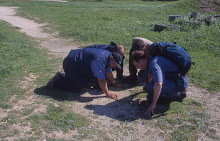I quote a passage I read on the web:
We can thus distinguish between two types of Lacanians: Oedipal or Talmudic Lacanians and post-mastery Lacanians that work on the premise that “there is no Other of the Other” and that “the big Other does not exist.” A Talmudic Lacanian is a Lacanian that restricts their discussion of Lacan and clinical practice to what Lacan taught, treating him as a master or Father who knows the truth, and endlessly interpreting that text in much the same way that the Talmudic scholar endlessly interprets Talmud without ever adding anything to it. The post-mastery Lacanian, by contrast, holds that Lacan showed us the way in terms ofhow he read and interpreted– for example, we get something entirely new in his way of approaching Freud, not a rote repetition of Freud –and in terms of how he worked with the mathemes. Recognizing that every Father or Master is castrated, that they’re allshams or imposters and semblances of mastery, the post-master Lacanian recognizes that Lacan said many valuable things, but that he didn’t say it all— indeed, Lacan constantly emphasizes that no one can say it all because “truth can only be “half-said” –and works with his teaching not as a closed system, but as a generative methodology for generating new insights that are remote from anything Lacan himself ever articulated.
This is even more true of Marx: there are talmudic marxist that endlessy repeat the words of the Master only permuting them, and (a minority of) marxists that think marxism is a method, not a doctrine. Good examples are Lenin and Wu Ming. But the same is true of many master, such as Aristotle or others. In (good) science masters are always discoverers of a method (Netwon for instance).
lunedì 28 marzo 2016
Lacan e la scrittura cinese
Nel post precedente dicevo che la teorizzazione di Lacan sarebbe assai più semplice se si uscisse dal soggetto. Scopro ora che lui stesso ha fatto questo passaggio in un momento più tardo, attraverso lo studio della scrittura e quindi della cultura cinese.
Jacques Lacan, Copernico e il reale
Credo che Jacques Lacan abbia capito in pratica tutto della vita psichica - partendo da Freud ma aggiungendo alcuni elementi importanti che gli permettono di curare, dopo le nevrosi risolte da Freud, il ben più difficile caso della piscosi. Solo che il suo sistema è tolemaico, centrato sul soggetto invece che sullo spazio che separa l'io dall'Altro - e come il sistema tolemaico era complicatissimo, così il sistema lacaniano è assai complesso, con tutto il suo gioco di specchi e controspecchi. Se si pone il centro sul reale, tutto diventa più semplice - e sostanzialmente si ritorna, però con maggiore consapevolezza, su quello che dicono le sapienze. Ma Lacan non ha torto a sostenere che il reale è l'impossibile, perché da un punto di vista copernicano il soggetto non + più il centro del mondo, ma diventa parte del mondo, il che è estremamente difficile da visualizzare - e perciè "impossibile". Una magnifica litografia di Escher, che vidi per la prima volta nel bel libro "Gödel Escher Bach an eternal golden braid" di Douglas Hofstadter, però tenta e reisce proprio in questo compito:
Il ragazzo guarda un paesaggio di cui fa parte, con tutte le distorsioni inevitabili, e soprattutto un angolo in alto a destra non disegnabile (in due dimensioni): l'impossibile di Lacan?
Etichette:
Copernico,
Escher,
psicanalisi,
senso della realtà
sabato 12 marzo 2016
My kingdom is not of this world
In the time of the life of Christe, the zealots was a groups of jews fighting against Rome domination. They were in other words the terrorists of the time. Christ was probably sympathetic with this group; in the Gospel of John is said that "they" (probably the zealots) wanted to take him to make him king. "My kingdom is not of this world "(John 18:36( means "I sympathize with the zealots, bu I am not a politician, my field is the spirit".
Iscriviti a:
Post (Atom)

